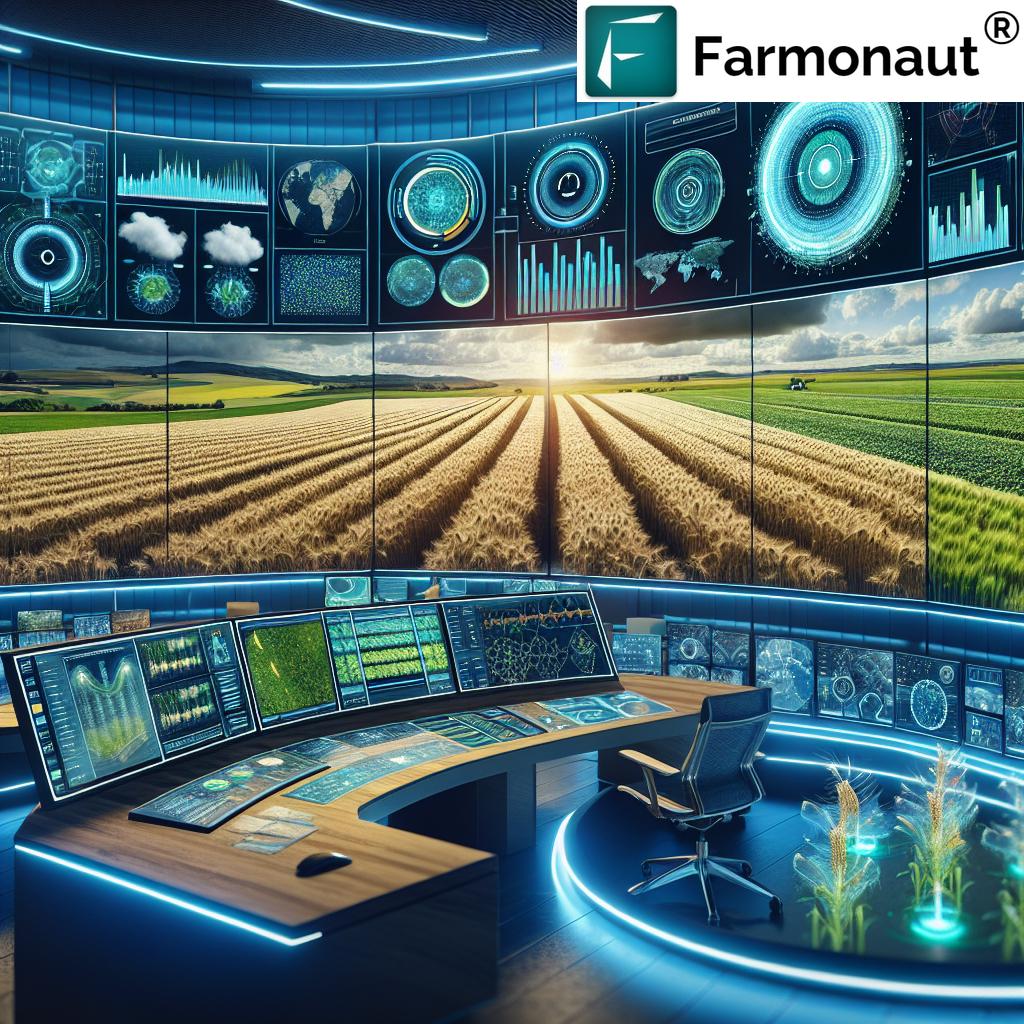Unlocking Agritech Potential: How Precision Agriculture Is Revolutionizing UK Farming Practices
“Precision agriculture technology has helped UK farmers reduce operational costs by up to 15% in recent years.”
Welcome to our comprehensive exploration of how precision agriculture technology and crop monitoring solutions are transforming the UK farming landscape. As we delve into this exciting realm of agricultural innovation, we’ll uncover the latest trends, challenges, and opportunities shaping the future of British agriculture.

In recent years, the agricultural sector has faced challenges similar to those experienced in retail, with rising operational costs and shifting consumer behaviors. However, the advent of smart farming techniques and sustainable agriculture practices has opened up new avenues for farmers to optimize crop yields and navigate financial pressures. Let’s explore how these technological advancements are impacting agricultural market trends and revolutionizing farming operations across the UK.
The Rise of Precision Agriculture in the UK
Precision agriculture technology has emerged as a game-changer for UK farmers, offering data-driven solutions to age-old farming challenges. By leveraging advanced sensors, satellite imagery, and artificial intelligence, farmers can now make informed decisions about every aspect of their operations, from seed selection to harvest timing.
- Satellite-based crop monitoring: Companies like Farmonaut are at the forefront of this revolution, providing farmers with real-time insights into crop health, soil moisture levels, and potential pest infestations.
- IoT sensors: These devices collect valuable data on soil conditions, weather patterns, and crop growth, enabling farmers to optimize resource allocation.
- AI-powered farm management software: Advanced algorithms analyze vast amounts of agricultural data, offering personalized recommendations for crop management strategies.
The adoption of these technologies has led to significant improvements in crop yield optimization and resource efficiency. UK farmers are increasingly turning to digital farming solutions to stay competitive in a challenging market environment.
Agricultural Data Analytics: Empowering Informed Decision-Making
At the heart of precision agriculture lies the power of agricultural data analytics. By harnessing the vast amounts of data generated by modern farming equipment and monitoring systems, farmers can gain unprecedented insights into their operations.
Key benefits of agricultural data analytics include:
- Optimized resource allocation
- Improved crop yield predictions
- Early detection of crop diseases and pests
- Enhanced sustainability through reduced chemical usage
Farm management software plays a crucial role in translating this data into actionable insights. Platforms like Farmonaut’s web app provide user-friendly interfaces that allow farmers to visualize and interpret complex data sets, making it easier to implement data-driven strategies.
Smart Farming Techniques Reshaping UK Agriculture
The integration of smart farming techniques is fundamentally changing how UK farmers approach their day-to-day operations. These innovative methods combine traditional farming knowledge with cutting-edge technology to create more efficient and sustainable agricultural practices.
- Variable rate application: Precision equipment adjusts the application of fertilizers and pesticides based on real-time soil and crop data, reducing waste and environmental impact.
- Automated machinery: GPS-guided tractors and harvesters improve accuracy and efficiency while reducing labor costs.
- Drone technology: Aerial imaging provides detailed crop health maps, enabling targeted interventions.
These smart farming techniques not only boost productivity but also contribute to sustainable agriculture practices, aligning with growing consumer demand for environmentally responsible food production.
Sustainable Agriculture Practices: A Win-Win for Farmers and the Environment
As the UK agricultural sector faces increasing pressure to reduce its environmental footprint, sustainable agriculture practices have become more critical than ever. Precision agriculture technology plays a vital role in achieving these sustainability goals while maintaining profitability.

Key sustainable agriculture practices enabled by precision technology include:
- Reduced water usage through precision irrigation systems
- Minimized chemical inputs thanks to targeted application techniques
- Improved soil health management using data-driven crop rotation strategies
- Enhanced biodiversity preservation through precision land management
By adopting these practices, UK farmers are not only reducing their environmental impact but also improving long-term soil health and productivity.
Navigating Financial Pressures with Agritech Solutions
The agricultural sector, much like retail, has been grappling with rising operational costs and shifting consumer behaviors. However, agritech solutions are providing farmers with powerful tools to navigate these financial pressures.
“Agritech investments in the UK farming sector have grown by 30% annually since 2018, reaching £500 million in 2022.”
Farm management software, such as that offered by Farmonaut, enables farmers to:
- Optimize resource allocation, reducing waste and unnecessary expenses
- Improve crop yields through data-driven decision-making
- Enhance market responsiveness by predicting consumer trends
- Access new revenue streams through precision agriculture services
These tools are proving invaluable as farmers seek to maintain profitability in an increasingly challenging economic landscape.
The Role of Agritech in Addressing UK Retail Challenges
While our focus is on agriculture, it’s worth noting the parallels between the challenges faced by the farming sector and those experienced in retail. Recent data from restructuring firm Begbies Traynor revealed a concerning rise in the number of UK retailers facing severe financial issues, with a 25% increase in retailers experiencing “critical financial distress” between October and mid-December 2023.
This trend underscores the importance of innovation and adaptation across industries. In agriculture, precision technology and data analytics are helping farmers respond to similar pressures by:
- Improving supply chain efficiency
- Enhancing product quality and consistency
- Reducing waste and operational costs
- Meeting changing consumer demands for sustainable and traceable products
By leveraging these agritech solutions, UK farmers are better positioned to navigate the economic challenges that are affecting various sectors of the economy.
Agritech Investment Opportunities in the UK
The rapid growth of precision agriculture technology in the UK has created exciting investment opportunities. As farmers increasingly adopt these innovative solutions, the demand for agritech products and services continues to rise.
Key areas attracting investment include:
- AI-powered crop management platforms
- IoT sensor networks for farm monitoring
- Blockchain-based supply chain solutions
- Autonomous farming equipment
Companies like Farmonaut are at the forefront of this agritech revolution, offering comprehensive solutions that combine satellite imagery, AI, and blockchain technology to address various agricultural challenges. Their API and developer documentation provide opportunities for further innovation and integration within the agritech ecosystem.
The Future of Digital Farming Solutions in the UK
As we look to the future, digital farming solutions are set to play an increasingly crucial role in shaping UK agriculture. Emerging technologies and trends to watch include:
- 5G connectivity: Enhanced rural internet infrastructure will enable real-time data processing and decision-making on farms.
- Edge computing: On-farm data processing will reduce latency and improve the responsiveness of precision agriculture systems.
- Advanced robotics: Autonomous robots for planting, weeding, and harvesting will further reduce labor costs and improve efficiency.
- Vertical farming: Urban agriculture solutions will complement traditional farming methods, addressing food security concerns.
These advancements promise to further revolutionize UK farming practices, driving increased productivity, sustainability, and profitability.
Impact of Precision Agriculture on Agricultural Market Trends
The widespread adoption of precision agriculture technology is having a profound impact on agricultural market trends in the UK. Key shifts include:
- Increased demand for high-quality, sustainably produced crops
- Growing market for precision agriculture equipment and services
- Emergence of new business models, such as data-driven farming consultancies
- Shift towards more direct-to-consumer sales channels enabled by improved traceability
These trends are reshaping the agricultural landscape, creating new opportunities for farmers, agribusinesses, and technology providers alike.
Strategies for Crop Yield Optimization in the UK
Crop yield optimization remains a top priority for UK farmers, and precision agriculture technology offers a range of strategies to achieve this goal:
- Precision planting: Using GPS-guided equipment to optimize seed spacing and depth
- Variable rate fertilization: Applying nutrients based on detailed soil analysis and crop requirements
- Integrated pest management: Utilizing data-driven approaches to minimize pesticide use while maximizing effectiveness
- Climate-smart agriculture: Adapting farming practices to changing weather patterns using advanced forecasting models
By implementing these strategies, UK farmers can significantly boost their crop yields while reducing input costs and environmental impact.
Comparison of Precision Agriculture Technologies
To better understand the impact of various precision agriculture technologies on UK farming practices, let’s examine the following comparison table:
| Technology Name | Primary Function | Estimated Adoption Rate (%) | Potential Yield Increase (%) | Estimated Cost Savings (£/hectare) | Environmental Impact |
|---|---|---|---|---|---|
| Satellite-based Crop Monitoring | Real-time crop health assessment | 35 | 10-15 | 50-100 | High |
| Drone Imaging | Detailed field mapping and analysis | 25 | 5-10 | 30-60 | Medium |
| IoT Sensors | Soil and environmental monitoring | 40 | 8-12 | 40-80 | Medium |
| AI-powered Farm Management Software | Data analysis and decision support | 30 | 12-18 | 60-120 | High |
| Variable Rate Application Systems | Precision input application | 45 | 15-20 | 70-140 | High |
| Automated Machinery | Efficient planting and harvesting | 20 | 5-8 | 50-100 | Low |
This table highlights the significant potential for yield increases and cost savings across various precision agriculture technologies. It’s clear that the adoption of these innovations can have a transformative impact on UK farming practices.
Accessing Precision Agriculture Solutions
For UK farmers looking to implement precision agriculture technology in their operations, there are several accessible options available. Farmonaut, for example, offers a range of solutions through its mobile and web applications:
These applications provide farmers with easy access to satellite-based crop monitoring, AI-driven advisory services, and other precision agriculture tools.
Conclusion: Embracing the Agritech Revolution
As we’ve explored throughout this blog post, precision agriculture technology is revolutionizing UK farming practices. From crop monitoring solutions to advanced farm management software, these innovations are helping farmers navigate financial pressures, optimize yields, and embrace sustainable agriculture practices.
The future of UK agriculture lies in the continued adoption and development of these digital farming solutions. By leveraging agricultural data analytics and smart farming techniques, UK farmers can position themselves at the forefront of a more efficient, sustainable, and profitable agricultural sector.
As we move forward, it’s clear that the integration of precision agriculture technology will play a crucial role in addressing the challenges faced by the UK farming industry, from rising operational costs to changing consumer demands. By embracing these innovations, UK farmers can unlock new potentials in productivity, sustainability, and profitability.
FAQ Section
- What is precision agriculture?
Precision agriculture is a farming management concept that uses technology to observe, measure, and respond to variability in crops, enabling more efficient use of resources and improved crop yields. - How does satellite-based crop monitoring work?
Satellite-based crop monitoring uses multispectral imagery to assess crop health, soil moisture, and other vital metrics, providing farmers with real-time insights into their fields’ conditions. - What are the main benefits of using farm management software?
Farm management software helps farmers make data-driven decisions, optimize resource allocation, improve crop yields, and reduce operational costs through efficient planning and monitoring. - How does precision agriculture contribute to sustainability?
Precision agriculture promotes sustainability by reducing water usage, minimizing chemical inputs, improving soil health, and enhancing biodiversity through targeted and efficient farming practices. - What are some common challenges in adopting precision agriculture technology?
Common challenges include initial investment costs, the need for technical expertise, data management and privacy concerns, and ensuring reliable internet connectivity in rural areas.






